
Devastating plant virus revealed in atomic detail
The complex 3D structure of one of the world’s most lethal families of plant viruses has been revealed in unprecedented detail by scientists at the University of Leeds.

The complex 3D structure of one of the world’s most lethal families of plant viruses has been revealed in unprecedented detail by scientists at the University of Leeds.

Monitoring Antarctica from space has revealed how its ice is being lost to the oceans, providing crucial insight into the continent’s response to a warming climate.

Ice losses from Antarctica have increased global sea levels by 7.6 mm since 1992, with two fifths of this rise (3 mm) coming in the last five years alone.

Scientists and educators involved in animal research in emerging countries are sharing good practice ideas, plus debating welfare and ethics, as part of pioneering work led by the University.

Early results from a small-scale clinical trial have revealed the potential of a virus to treat some advanced cancers.

Water samples from UK rivers contained significantly higher concentrations of microplastics downstream from wastewater treatment plants, researchers have found.

Princess Kako of Akishino, the 23-year-old granddaughter of Japanese Emperor Akihito, has completed her year as an exchange student at the University of Leeds.

Adults with incurable diseases – including dementia, liver failure and stroke – are not being referred to palliative care from hospices early enough during their illness, according to new research.

A £103 million revolution to develop new technologies which will drive forward biology and medicine research and development has been officially launched today.

Long-lived seabird species, such as gannets, take several years to learn where the best feeding grounds are and how to recognize them, new research has revealed.